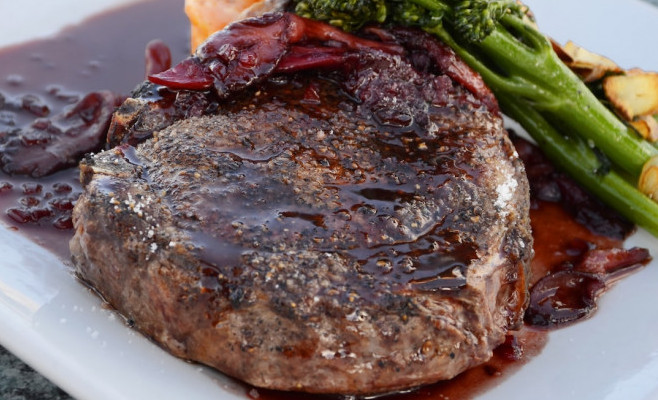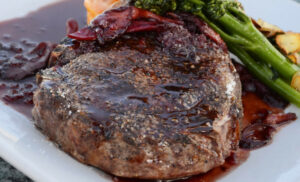Should I Eat Less Red Meat?
Making a transition to eating less red meat should involve a gradual reduction, exploring plant-based proteins and new recipes, and making sure to still get enough of other important nutrients. Should you stop eating red meat, especially after the age of 50? Well, it depends. The short answer is you should definitely consider moderation.
Dietary needs change as we age, and that means we have to pay closer attention to what we eat. It’s a pain, but it’s just that simple. But what should we eat? What should we cut out of our diets? One of the most asked questions around this subject is whether we should stop eating red meat, or at least eat less of it.
First of all, this is not an endorsement or encouragement of vegetarian or vegan lifestyles. I am over 50 but I still like to weight train. For me, it’s the best way to keep my weight (somewhat) under control and it improves my energy and confidence–so I like red meat because I feel like it helps me lift more and heavier weight. I’m a big fan. The taste of a perfectly grilled medium rare steak is one of life’s great pleasures.
Besides, red meat is a great source of protein, creatine and other nutrients. But, as with everything, moderation is the key. I used to eat red meat 5 times a week, but that kind of consumption year after year, can begin to put a strain on the health of us over 50 folks. That’s why in this article, we show why eating less red meat might be a good thing for you, and we offer some easy-to-follow tips to help make the transition.
By the way, pork is NOT the other white meat…it is red meat. Oh, and there really is not much evidence that eating organic or grass fed beef is a healthier option. The Beef With Red Meat.
Benefits of Less Red Meat
Here are just a few of the most important reasons you should consider eating less red meat.
Reduced Risk of Heart Disease
Red meat is high in saturated fat and that can be a significant factor in developing heart disease. High levels of saturated fat raise your cholesterol–and I mean the bad kind, that clogs arteries. And that, can contribute to heart disease. The Harvard Medical school suggests, at a minimum, cutting down on portion size and eating more lean red meat like sirloin or filet mignon. (Man, isn’t that fatty Hawaiian ribeye at Houston’s the best in the world?) Reducing red meat intake can help decrease the risk of heart disease. Harvard Article.
Reduced Risk of Certain Cancers
Eating too much red meat has been linked to an increased risk of some forms of cancer like colorectal, pancreatic, and prostate. This is not a medical site and we don’t want to get too heavy, but just remember eating fewer meals of red meat can help lower the risk of developing some types of cancer. MD Anderson Article.
Better Weight Management
Though it certainly is not always the case, red meat can often be high in calories. This is not to say that turkey or chicken don’t have significant caloric content, but red meat like prime rib, beef ribs, and pork ribs can contain well over 300 calories per 100 gram serving. It doesn’t require a huge leap to see how eating fewer calories can make it easier to manage our weight.
Better Digestion
It can take 8-12 hours to digest some red meat heavy meals. Once we turn 50 our bodies can start to produce less  stomach acid than before and this can make it more difficult to fully digest red meat. Having less undigested food in the stomach is a good thing. By eating less red meat, we can improve digestion and reduce some common forms of discomfort like heartburn, bloating, and gas.
stomach acid than before and this can make it more difficult to fully digest red meat. Having less undigested food in the stomach is a good thing. By eating less red meat, we can improve digestion and reduce some common forms of discomfort like heartburn, bloating, and gas.
How To Start Eating Less Red Meat
Take It Slow
- Cut back to 1 or 2 servings of red meat per week. Try to consume it even less frequently over time.
- Don’t make red meat the focus of every meal. Think about serving red meat in smaller portions as an appetizer or as part of a salad, instead of it always being the featured food.
Try New Recipes
- If you gotta have meat (and I do), look for recipes that use leaner sources of animal proteins, like chicken or fish
- Plant based proteins. It’s not so bad if you experiment a bit to find out which ones you enjoy–like beans, lentils, and even tofu. If you can substitute some of these proteins for red meat, you could be well on your way.
Don’t Forget Other Nutrients
If we start eating less red meat, we should remember that we still have to get enough of other important nutrients, like iron, B-12, zinc and niacin. Keep it simple by considering multi-vitamins or better yet, fortified cereals, leafy greens, and nuts.
The Bottom Line
So there it is. Eating less red meat can be a positive step towards improving health, especially for those of us who are over 50. We can help reduce the risk of heart disease and certain types of cancer, manage weight more effectively, and improve digestion. When making the transition to a diet of less red meat, start slow, experiment with plant-based proteins and new recipes, and make sure to get enough of other important nutrients.
As always, BetterLifeafter50.com welcomes your questions and comments. Please feel free to leave your feedback below.



This is a very informative article. I am well over 50. Although not intentionally, I have found that I have less desire for red meat than I did when I was younger. I am eating more fish and a wider variety of vegetables. I also do weight training. For this reason, I have been worried about cutting out red meat entirely. We are trying different recipes that have red meat but in much smaller quantities. For example, I am preparing a BBQ beef salad for dinner tonight but each service has less than two ounces of beef. The juice of the BBQ over the vegetables seems to fill the bill. Thanks for the tips in this article.
Thank you Anastazja. You’ll likely find that your weight training won’t really be negatively affected by cutting down on red meat. I actually have MORE energy now!
I have cut down myself on red meat and most of all processed meat as well,as I knew for a long time that this can’t be good for your health, at any age even. Once I was told to start eating more red meat, because I was having heavy menstrual issues, but then I didn’t feel well from eating that much red meat, so I switched to Iron supplementation and that helps to keep the Iron levels up. But I never ate red meat 5 times per week though, that is a lot haha!
Thank you Lizzy! Nutrient supplementation is a good option and calorie friendly.
I’m well over 50 and want to be rid of all meat forever. But I seem to be addicted to it.
I can go for ages without it and not even notice I’m missing anything, but then I get some chicken, for free, at the food bank and all of a sudden I’m madly craving more and more of it. I start buying it again, feeling grossed out by the idea of anything else. And I have gout, too, which is a REALLY good reason to avoid it. But when I’m in that part of the cycle, I just don’t care.
It really FEELS like an addictive response. It’s the same thing over and over again. Eating it almost non-stop; gradually weaning myself off it; having none and not missing it; and then back around to getting triggered into wanting it desperately.
I’ve never heard of meat being considered addictive. I guess it’s just so much a part of life as we know it that nobody ever questions it. What do you think? Is it an addictive substance?
We have the teeth and digestive systems of frugivores…
Interested in your thoughts on the subject.
Anna
Interesting point. I have heard of people who love the taste and texture of red meat so much, that they have trouble eating less of it. I haven’t (yet) come across research that suggests eating it can lead to addiction, but that does’t mean it’s not out there. Thank you for comments Anna!